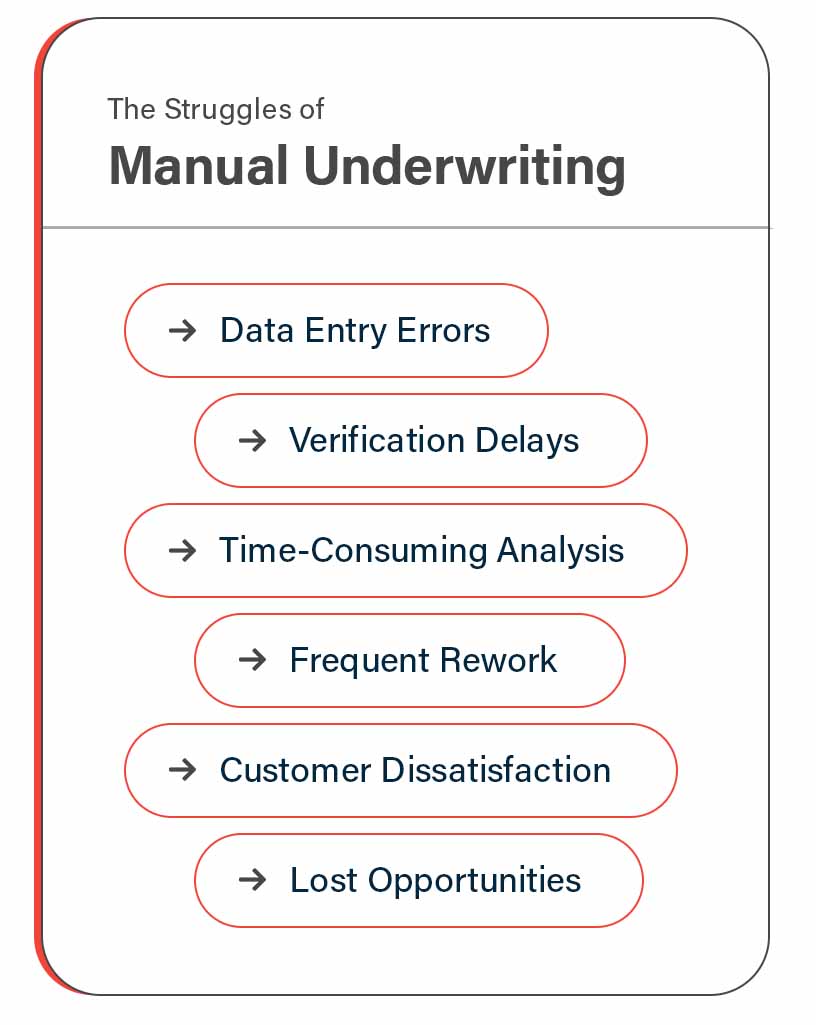The Group Health Underwriting Team’s Playbook for Efficiency: How Automation Can Empower Your Team to Achieve More

Challenges of Manual Underwriting in Group Health Insurance
Underwriting teams in group health insurance companies face significant challenges due to manual processes. These include:
-
- Administrative Burdens: Time-consuming data management tasks that distract underwriters from strategic activities.
- High Volume Quoting: Driven by market expansion and broker activities, leading to overwhelming workloads.
- Complex Risk Assessments: Manual processes result in inaccurate and delayed risk profiling.
- Operational Inefficiencies: Slow quote turnaround times and workflow bottlenecks hinder productivity.
- Customer Expectations: Increasing demand for faster, more personalized service puts pressure on underwriters.
Impact on Productivity and Decision-Making
Manual processes divert underwriters from their core responsibilities, leading to inefficiencies and increased errors. This not only hampers productivity but also limits strategic decision-making and innovation. The inability to quickly and accurately assess risk impacts the competitiveness and profitability of the insurance company.

The Struggles of Manual Underwriting
Inefficiencies in Data Entry, Verification, and Analysis
Manual data entry is prone to errors and requires significant time. Verification processes are inconsistent, causing further delays and inaccuracies. These inefficiencies hinder the underwriting process and reduce overall effectiveness.
-
- Data Entry Errors: Frequent errors in manual data entry lead to inaccurate risk assessments.
- Verification Delays: Inconsistent verification processes cause delays in underwriting decisions.
- Time-Consuming Analysis: Manual analysis is slow, reducing the number of quotes processed.
Delays, Errors, and Rework
Errors and the need for rework slow down the process, leading to frustration among underwriters and delayed decision-making. These delays impact customer satisfaction and the company’s ability to respond quickly to market opportunities.
-
- Frequent Rework: Errors require rework, further slowing down the process.
- Customer Dissatisfaction: Delays in processing quotes lead to dissatisfied customers.
- Lost Opportunities: Slow response times result in missed market opportunities.

Underwriter Frustrations
Underwriters express frustration with the inefficiencies of manual processes. They spend more time on administrative tasks than on strategic risk assessment and customer interaction.
Quotes from Underwriting Professionals:
“I spend more time entering data than actually assessing risk.”
Senior Underwriter
Mid-Sized Health Insurance Carrier
“Verification is a tedious process, and errors are inevitable.””
Underwriting Manager
Large National Insurance Company
“The constant rework due to data entry mistakes is incredibly frustrating.”
Lead Underwriter
Regional Health Insurance Provider
Manual underwriting processes create significant obstacles for group health insurance companies, from administrative burdens and high-volume quoting to complex risk assessments and operational inefficiencies. These challenges not only slow down the underwriting process but also lead to frequent errors, delays, and underwriter frustration. As underwriters spend more time on administrative tasks than on strategic activities, productivity suffers, and opportunities for innovation and market responsiveness are lost.
To address these challenges and remain competitive, insurance companies must consider the implementation of an underwriting workbench. An underwriting workbench can streamline workflows, enhance accuracy in risk assessments, and reduce manual tasks, allowing underwriters to focus more on strategic decision-making and customer engagement. In the next section, we explore the importance of an underwriting workbench and how it can transform underwriting operations for better efficiency and profitability.


